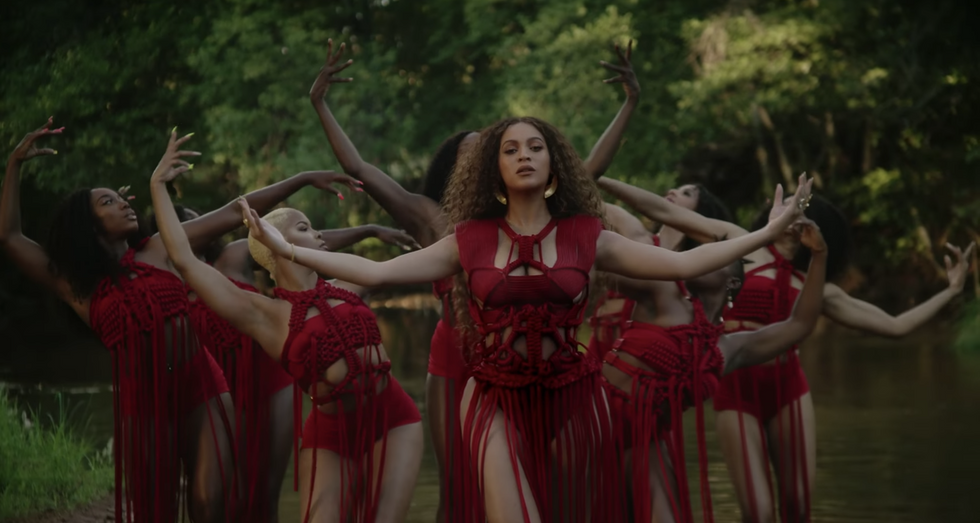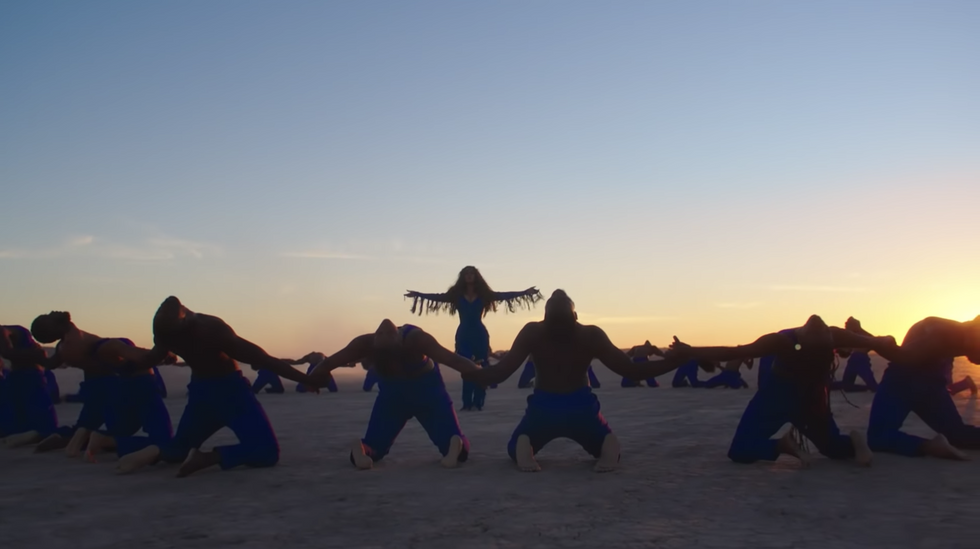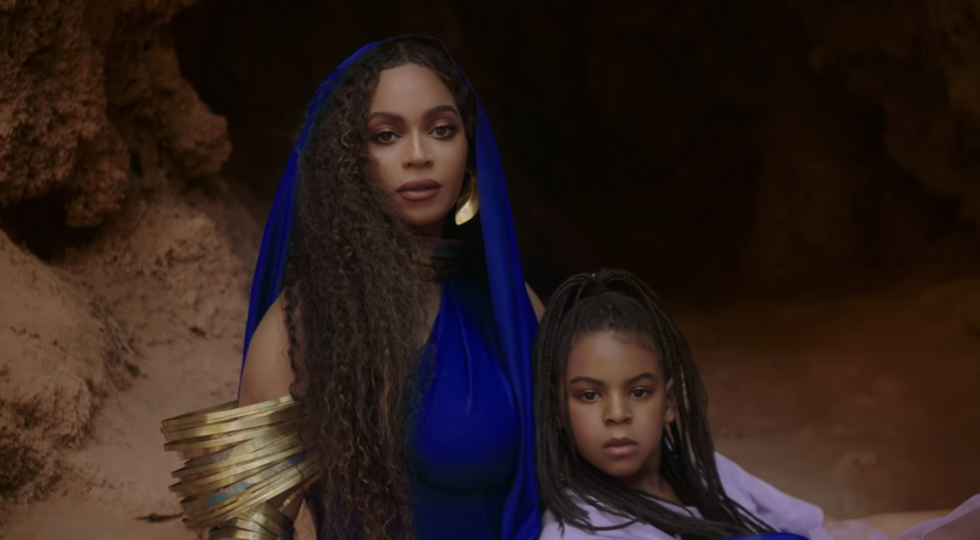Music
Beyoncé Brings Afrobeats to Mainstream Audiences with “Lion King: The Gift”
20 Jul, 19

Beyoncé in all her glory.
Columbia Records
Beyoncé’s Lion King: The Gift is in direct competition with the live-action remake’s 2019 soundtrack.
It’s difficult to imagine Disney allowing any other artist to challenge the success of their latest production, but Beyoncé has surpassed celebrity—she is a movement, an icon, and a spokesperson for a generation, and her name being associated with the movie can only mean good things for the company, even if her Lion King-inspired album is separate from the movie in which she stars. After all, Disney’s remakes have received criticism from the get-go. What was the need for a live-action remake of a movie conceived by a bunch of white executives who referred to the project as “Bambi in Africa?”
Still, Beyoncé’s involvement loaned the project credibility, and clearly the artist saw the potential to reclaim the Africa-set narrative to create what she calls “sonic cinema.” She worked with “some of her favorite artists [and] the most talented and important African artists of the day to both pay tribute to the iconic film and bring the authentic sounds of African music to the world.” Although how authentically and accurately the star’s achieved this goal is up for debate, there’s no question that Beyoncé was able to use her influence to shine a spotlight on the diverse range of artists, some who even outshine her.
The album begins with James Earl Jones, backed by a soft violin, repeating Mufasa’s iconic lines to Simba: “Everything you see exists together in a delicate balance. You need to understand that balance and respect all the creatures. From the crawling ant to the leaping antelope. We’re all connected in the great circle of life.” This sentiment, that all African people are connected, is emphasized throughout the rest of the album. The interlude is followed by “BIGGER,” Beyoncé’s lyrical build up to the message,”If you feel insignificant, you better think again / Better wake up because you’re apart of something way bigger.” It’s another reminder that every person is connected to each other and to the earth.

Another poignant interlude spoken by James Earl Jones introduces “FIND YOUR WAY BACK,” an R&B, Afrobeat version of Lemonade‘s “Daddy Issues.” Unlike the original, “FIND YOUR WAY BACK” is a filler song with an infectious beat—it seems to exist just to add to the story of The Lion King. It has nothing on the songs that follow: Tekno, Yemi Alade, Mr Eazi, and Lord Afrixana’s “DON’T JEALOUS ME” and Burna Boy’s “JA ARA E.” Both tracks are danceable but in distinctly different ways. The gritty and visceral “DON’T JEALOUS ME” produces a teeth-clenching, head-bouncing effect—it’s captivating and mystifying, while “JA ARA E” is a hip-swinging, sexy summer anthem.
The Nigerian Afro-fusion artists highlight exactly what the Western world is missing out on, musically. The variety and simple good vibes could create a cultural moment for Afro-fusion in Western mainstream music, similar to what “Despacito” did or Latin Pop (minus Justin Bieber, thankfully).

Next, “NILE” and “MOOD 4EVA” keep the album’s soulful momentum going, despite the many interludes beginning to bog down the bops. Kendrick Lamar’s classic rap delivery on “NILE” sets up another one of his iconic beat-drops. But, in the last thirty seconds of the track, Beyoncé’s textured vocals end too quickly, making “NILE” feel incomplete. “MOOD 4EVA” captures all that was successful about The Carter’s EVERYTHING IS LOVE album. Beyoncé’s voracious performance and enchanting, oozing confidence outperform Jay-Z’s. Beyoncé outdoes him with lyrics like, “Piña colada-in’ / you stay Ramada Inn,” and concluding with, “I be like soul food / I am a whole mood.” Unfortunately, the song’s low-point is Childish Gambino’s feature, which only makes a minor contribution to the already electrifying mood.
At the album’s halfway mark, the majority of the noteworthy tracks have already passed. “BROWN SKIN GIRL” and “MY POWER” are the only tracks left that stick in the mind of listeners. The sweet-natured, empowering “BROWN SKIN GIRL” begins with Blue Ivy Carter’s first singing performance. Then Nigerian artist WizKid aids the celebratory track, which speaks directly to the brown skin girls of the world. The song separates itself from the rest of the album as an easier, mellower, lullaby-inspired song, while still positioning black people at the center of the celebration.

Conversely, up-and-coming rapper, Tierra Whack, leads “MY POWER” with the declaration, “They’ll never take my power / They feel a way, oh wow”—celebrating all black women and what they’re capable of. On the track, South African artists—Moonchild Sanelly and Busiswe—gloriously sing African praises, injecting the song with an emboldened, unwavering verse.
The rest of the album has its individual, exceptional moments, like Beyoncé’s almost holy vocals on “OTHERSIDE” and Jessie Reyez’s ingenious verse on “SCAR.” But, still, only six out of the fourteen main tracks succeed in creating something new, inspiring, and other-worldly. The other interludes strip Lion King: The Gift of cohesion and flow. But still, with The Lion King: The Gift, Beyoncé has cemented her legacy of celebrating black experiences and art by bringing African musical influences to Western, mainstream audiences. If there was any doubt left that Beyoncé is more than just an indomitable vocalist, surely it’s been dispelled once and for all by this album. Lion King: The Gift demonstrates what is possible when collaboration occurs across borders to create cross-cultural, truly globalized music.
The Lion King: The Gift
- Beyoncé and Jay-Z Make Music with Everything Is Love – Popdust ›
- Beyoncé Drops New 40-Track Album Featuring Blue Ivy – Popdust ›
- Watch Beyoncé Shine In New “Spirit” Video for “The Lion King … ›
- Why Beyonce’s Lemonade Was One of the Best Pieces of Art Ever Made – Popdust ›
- ‘Bambi’ Is Sure to Be the Worst Disney Remake Yet – Popdust ›
- Beyoncé and Jay-Z Make Music with Everything Is Love – Popdust ›
- Beyonce Faces a Challenge on ‘Lion King The Gift’ — Breaking … ›
- Beyoncé, The Lion King: The Gift, review – All hail the lion queen ›
- The Lion King: The Gift by Beyoncé Reviews and Tracks – Metacritic ›
- Beyonce’s The Lion King: The Gift review: New album is way better … ›
- Beyoncé: The Lion King: The Gift review – superstar shows … ›
- Beyoncé’s ‘The Gift’ album features Blue Ivy’s singer-writer debut ›














